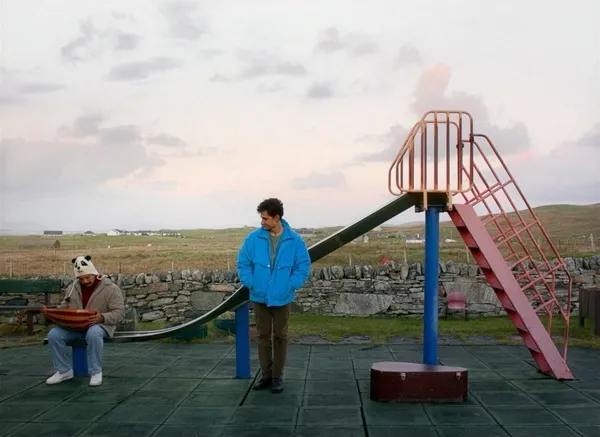Eye For Film >> Movies >> Limbo (2020) Film Review
Limbo
Reviewed by: Robert Munro

Limbo, the second film from writer-director Ben Sharrock after 2015's Pikadero, is a stubbornly funny film of unquenchable sadness. As others have noted, Sharrock’s deadpan comedy brings to mind Aki Kaurismaki and Bill Forsyth – and the recurring phone box in Limbo inevitably recalls Local Hero – but ultimately this is a film brimming with freshness in its ideas and their execution.
Omar (Amir El-Masry) is one of a number of refugees, all single men, seeking asylum on a remote, windswept Scottish island in the Outer Hebrides. These are men chased to The Edge of the World, though in a reversal to Michael Powell’s tale of the evacuation St Kilda, the small number of refugees housed here have increased the population by around 25% according to one of the mirthless locals.

Omar shares accommodation with Farhad (Vikash Bhai), an Afghan who appoints himself as Omar’s agent/manager, as well as the Ghanaian Abedi (Kwabena Ansah) and Wasef (Ola Orebiyi), a Nigerian with dreams of playing for Chelsea, who pretend to be brothers to improve the chances of their asylum claims. We’re introduced to the men through a wonderfully comedic opening, in which Boris (Kenneth Collard) and Helga (Sidse Babett Knudsen) roleplay an excruciating sexual harassment scenario about inappropriate contact ("a smile is not an invitation") to the obvious bafflement of the men. Boris and Helga’s English and Nordic accents betray their similar migratory status, and we assume they arrived in the 1980s and never updated their wardrobe, yet here they are trying to help integrate the men into Western society.
The skill with which Limbo marries absurdist humour and tragedy is evidenced in a scene where Boris and Helga attempt to teach the men the past tense. Boris’ crass attempt at cultural insight – "I used to ride my elephant to work" – is countered by one of the men’s more painfully eloquent responses – "I used to cry myself to sleep before my tears ran dry" – which receives an ovation led by Helga.
Omar is a talented musician, but can’t bring himself to play his oud – it doesn’t sound right any more – and the men bond despite their loneliness through pieced together fragments of globalised identities: we first see them in their accommodation watching a bootleg DVD of Friends – an episode where Ross, too, can’t bring himself to play music for a crowd. The humour is everywhere, particularly in the film’s opening half. A trip to a local ‘supermarket’ provides much amusement, especially for local audiences brought up on the sitcom Still Game, as the turbaned Glaswegian shopkeeper (Sanjeev Kohli) takes offence at a racist epithet unwittingly used by Omar, before wondering whether it is indeed racist "if it comes from another brown person". When Omar asks him for Sumac, and explains it is a spice, the shopkeeper retorts that he has spices: ketchup and mustard.
Omar’s isolation and homesickness are compounded when police remove a number of the men for working illegally, while Abedi and Wasef ultimately also discover that there is no shelter and solace to be found in this remote outpost. Eventually Omar’s desperation reaches a peak (literally and metaphorically) as he tries to reconnect with his older brother, who has stayed in Syria to fight, and from whom Omar has not heard from in some time, obvious implications and all. Omar’s parents now reside in Istanbul and their scattered and fractured family is a source of tension, relayed through that grubby phone box, alongside his mother’s confusion between Stallone and Schwarzenegger: Rambo and The Terminator.
Limbo is a deeply moving film, which envelops its audience in an atmosphere of growing despair, but one which is frequently shot through with the best kind of absurdist humour which draws more truth from these characters and this place than a more conventionally sympathetic portrayal might have. The central performances are uniformly excellent, and the supporting cast, when called upon, provide guffaws on cue. So much of the film hangs on Amir El-Masry’s face – often framed in ravishing close up by Sharrock and cinematographer Nick Cooke, and given heightened impact by the tightness of the 4:3 ratio through which most of the film is composed. But credit, too, for Vikash Bhai’s very funny turn as Farhad, whose hangdog sullenness recalls Buster Keaton and Elia Suleiman.
Given unfortunate topicality by the deaths of refugees in Glasgow this year, and the UK Home Office’s despairing plans for island detention centres, Limbo offers a deeply intelligent critique of the temporality of Western empathy, and firmly announces Ben Sharrock as a Scottish filmmaker of worldly talents.
Reviewed on: 17 Oct 2020















